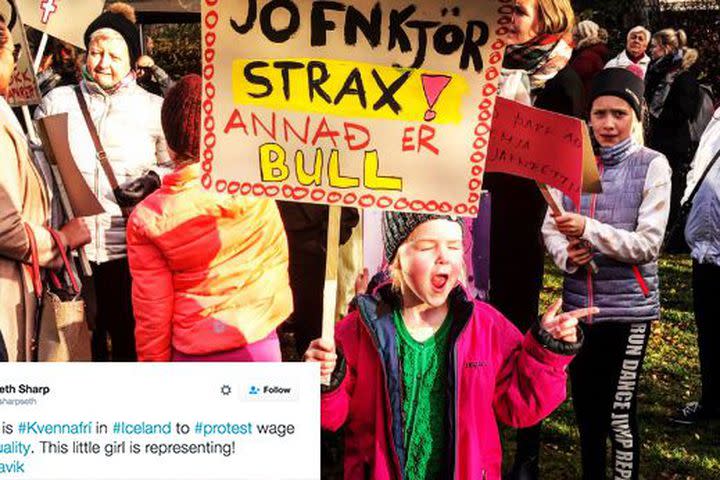Las mujeres de Islandia se van a ir antes del trabajo hasta que no cobren lo mismo que los hombres
Islandia es el país más igualitario del planeta. Desde 2009, encabeza el ranking de países donde hay una mayor igualdad entre hombres y mujeres, según el Informe del World Economic Forum sobre Igualdad de Género. Este hecho se debe a la importancia que concede el gobierno a la conciliación entre vida familiar y laboral.
Desde el año 2003, los islandeses tienen un sistema de bajas parentales que concede tanto a hombres como a mujeres nueve meses de permiso para atender a sus hijos recién nacidos. La madre dispone de tres meses, lo mismo que el padre. Además, cuentan con tres meses adicionales que ambos progenitores pueden repartirse según les convenga.

On Monday afternoon at precisely 2:38 p.m., women across Iceland downed tools and walked out of work for an event called "Women's Day Off".
Áfram við, þetta er magnað. #KVENNAFRÍ #jöfnkjör pic.twitter.com/qmgboB1MnD — Salka Sól Eyfeld (@salkadelasol) October 24, 2016
Though the event's name might suggest otherwise, the event is far from a day off. On Monday, women across the country went on strike to protest the persistent gender pay gap, which currently stands at 18 percent. The event's start time — 2:38 p.m. — coincides with the exact moment that women on average begin working for free each day due to this wage gap.
Go girls!#kvennafri pic.twitter.com/gyvzmDRTTK — Halldóra Mogensen (@Halldoramog) October 24, 2016
On Monday afternoon, striking women took to Austurvöllur square in Reykjavík to march in protest of the pay gap. Women's Day Off first took place over 40 years ago on Oct. 24, 1975, when 90 percent of Icelandic women went on strike. In 1975, women in Iceland were paid less than 60 percent of men's earnings, and many women weren't able to work due to housework and childcare duties. On that day in 1975, the nation's women did not go to their paid jobs, and ceased to do housework and childcare.
My daughter Margrét (11) marching w all the women of Iceland today,demanding equal pay. They all quit work symbolically at 14:38. #kvennafri pic.twitter.com/SrqVSkHC2F — Hallgrímur Helgason (@HalgrimHelgason) October 24, 2016
The day — which was backed by women's rights organisations — aimed to highlight the indispensable contribution of women's work for Iceland's economy and society. On that day, newspapers were not printed because the typesetters — all of whom were female — were on strike. Theatres were closed because female actors were observing the day, schools closed because teachers were striking, flights were cancelled because flight attendants were absent and male bank executives assumed the role of tellers for the day.
Today is #Kvennafrí in #Iceland to #protest wage #inequality. This little girl is representing!#reykjavik pic.twitter.com/Tf7VeEiUco — Seth Sharp (@sharpseth) October 24, 2016
25,000 women — one-fifth of the country's population at the time — took to the streets of Reykjavík that day to protest the pay disparity. Forty years later, Iceland is top of the World Economic Forum's gender gap index, and was recently named the best place in the world for working women.
For now, Icelandic women will not give up their tireless quest for equal pay.
BONUS: Trump says he respects women
El país tiene el más alto nivel de empleo femenino del mundo, superior al 80 por ciento. Pero no todos es de color de rosa. Hay un punto en el que sigue existiendo desigualdad: en los salarios. Se estima que los hombres cobran un 14% más de media que las mujeres. Y aunque hace tan solo 5 años esa cifra era del 20% -lo que revela el éxito que está teniendo el gobierno actual en atajar esta situación- los islandeses consideran que es una injusticia enorme.
Por eso, las mujeres del país han decidido pasar a la acción. Hasta que no se iguale su sueldo al de los hombres, van a realizar protestas periódicas que consisten en trabajar un porcentaje de tiempo igual al de la brecha salarial menos que sus compañeros. Así, las empleadas saldrán de sus oficinas un 14% más pronto que los hombres. Por ejemplo, si el fin de la jornada se produce a las 16:00, ellas saldrán a las 14:38.
A pesar de la originalidad de la protesta y de que todo el país apoya a las mujeres en esta acción, los analistas económicos no son muy optimistas respecto a que la brecha salarial desaparezca pronto. Según sus estimaciones, tendrán que pasar 52 años hasta que los hombres y las mujeres de Islandia cobren lo mismo, según revela The Guardian.
En España estamos haciendo el camino contrario al emprendido por Islandia. En nuestro país, la brecha salarial ha aumentado en los últimos 6 años y alcanza en la actualidad un 24% . Es decir, que las mujeres tendrían que trabajar 88 días más al año para poder tener el mismo sueldo que sus compañeros.
Si las mujeres españolas decidieran llevar a cabo la misma protesta que en Islandia, tendrían que abandonar la oficina 2 horas antes que sus colegas de trabajo. O irse de vacaciones tres meses. ¿Se acabaría así esta injusticia?

 Yahoo Finanzas
Yahoo Finanzas 